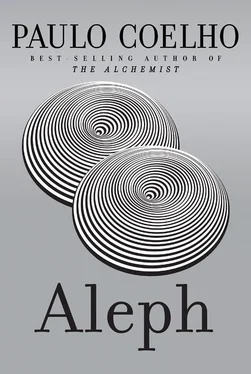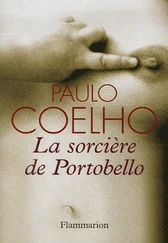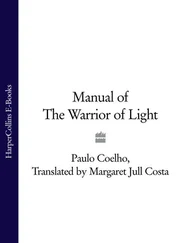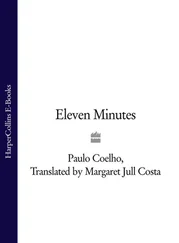A guard punches me in the stomach, and I double up, all the breath knocked out of me, but still I look up. The cart is moving past now, and I won’t be able to catch it again.
I PUSH HILAL AWAY. We are back on the train.
“I couldn’t see clearly,” she says. “It looked like a crowd shouting, and there was a man wearing a hood. I think it was you, but I’m not sure.”
“Don’t worry.”
“Did you get the answer you needed?”
I would like to say, “Yes, I finally understand my destiny,” but my voice is choked with tears.
“You won’t leave me alone in this city, will you?”
I put my arms around her.
“Of course I won’t.”
THAT NIGHT, when we return to the hotel, Yao is there, waiting for Hilal with a return ticket to Moscow. We will fly back on the same plane, although in different classes. My publishers cannot accompany me to my audience with Vladimir Putin, but a journalist friend of mine has permission to do so.
When the plane lands, Hilal and I leave through different exits. I am led into a special room, where two men and my friend are waiting. I ask to go to the terminal where the other passengers are disembarking, saying that I need to say good-bye to someone. One of the men says there isn’t time, but my friend points out that it’s only two in the afternoon and the meeting isn’t until five. And even if the president were waiting for me at the house outside Moscow where he’s usually to be found at this time of year, it will take us, at most, fifty minutes to get there.
“Besides, if there’s any problem, your cars are fitted with sirens, aren’t they?” he says jokingly.
We make our way to the other terminal. I enter a florist’s and buy a dozen roses. We reach the arrivals gate, which is crowded with people waiting for friends and relatives arriving from far-flung places.
“Does anyone here understand English?” I shout.
People look startled, doubtless because of the three burly men with me.
“Does anyone speak English?”
A few hands are raised. I show them the bouquet of roses.
“A young woman whom I love very much will be arriving shortly. I need eleven volunteers to help me give her these flowers.”
Eleven volunteers immediately appear by my side. We form a queue. Hilal comes out of the main door, sees me, smiles, and heads straight for me. One by one the volunteers hand her the roses. She looks half confused and half happy. When she finally reaches me, I hand her the twelfth rose and fold her in the warmest of embraces.
“Aren’t you going to tell me you love me?” she asks, trying to keep control of the situation.
“Yes. I love you like a river. But now we must say good-bye.”
“Good-bye?” she says with a laugh. “You’re not going to get rid of me that easily.”
The two men who are to be my escorts suddenly say something in Russian. My journalist friend laughs. I ask him what they said, but Hilal herself translates.
“They said it’s the most romantic thing they’ve ever seen in this airport.”
Saint George’s Day, 2010
I MET HILAL AGAIN in September 2006 when I invited her to take part in a conference at the Monastery of Melk in Austria. We traveled from there to Barcelona, then on to Pamplona and Burgos. It was in one of those cities that she told me she had left music school and given up playing the violin. I tried to convince her to reconsider, but something inside told me that she, too, had become queen of her world again and needed to rule over her own realm.
While I was writing this book, Hilal sent me two e-mails saying that she had dreamed I was writing about what had happened between us. I asked her to be patient, and told her about the book only when I had finished writing it. She didn’t appear to be surprised in the least.
I wonder if I was right to think that if I missed that opportunity with Hilal, I would have another three chances (after all, eight girls were to be executed that day, and I had already met five of them). I doubt now that I will ever know; of the eight girls condemned to death, only one really loved me, the girl whose name I never knew.
I no longer work with Lena, Yuri Smirnov, and the Sofia Publishing House, but I would like to thank them for the unique experience of traveling across Russia by train.
The prayer of forgiveness used by Hilal in Novosibirsk is one that has already been channeled by other people. When I say in the book that I had heard it before in Brazil, I am referring to the spirit of André Luiz, a little boy.
Finally, I would like to warn against the use of the ring-of-light exercise. As I mentioned earlier, any return to the past with no knowledge of the process can have dramatic and disastrous consequences.
Aleph
by Paulo Coelho
Reading Group Guide
In 1945, Jorges Luis Borges published “The Aleph,” a cryptic short story that introduced his readers to a new and provocative spiritual concept. In it, the narrator—a fictionalized version of Borges himself—is tempted into a dark cellar by a poet and enemy who claims that it contains the true source of his creativity: a small spot that he called the Aleph, or “the only place on earth where all places are—seen from every angle, each standing clear, without any confusion or blending.” Suspicious of the poet’s motives, the narrator is nonetheless dazzled by the visions and sensations that overtake him when he steps past the narrow trapdoor. “The Aleph’s diameter was probably little more than an inch,” he writes, “but all space was there, actual and undiminished…. I saw the teeming sea; I saw daybreak and nightfall…. I saw the Aleph from every point and angle, and in the Aleph I saw the earth and in the earth the Aleph and in the Aleph the earth.” Overwhelmed, the narrator staggers upstairs to the waiting poet and enacts the ultimate revenge: he pretends he has seen nothing and recommends that the man take advantage of the curative effects of country air and sunshine. But in reality, his entire future has been altered; he dedicates himself to discovering all there is to know about the Aleph, its origins, and the very real possibility that these magical points of infinite understanding exist all over the world.
With Aleph , internationally best-selling author Paulo Coelho takes the concept of the Aleph to new heights, spinning it into a novel that rivals The Alchemist in its capacity to transform those who read it. Like the narrator created by Borges, Aleph ’s narrator shares key details with his creator: his name is Paulo, and he’s a successful author with a devoted worldwide following. However, this Paulo is facing a grave spiritual crisis, one that threatens to undo his decades-long search for wisdom and understanding. When Paulo poses the problem to his mentor in the magical Tradition, he’s offered a contradictory solution. “You’re not here anymore,” his mentor says. “You’ve got to leave in order to return to the present.”
At first Paulo is skeptical; between his previous spiritual quests and promoting his books, he’s traveled extensively and is tired of dealing with confusing languages and even more confusing currency. But when he’s presented with the rare opportunity to go on tour via the Trans-Siberian Railway, he trusts his mentor’s instincts and embarks on a voyage that he hopes will revitalize his passion for life. He never expects to meet Hilal, a young violinist who fervently insists that Paulo can heal her pain. He’s even more astonished when a chance encounter in an empty train car thrusts them both into an Aleph, leaving the two with visions of a shared past life and a devastating betrayal that prevents them from finding happiness in this lifetime. As they embrace the limitless power of the Aleph and submit to the mercy of the Universe, they—and Aleph ’s readers—gain a chance to rewrite their destiny. Inspiring, transformative, and full of Coelho’s unique blend of spiritual and practical wisdom, Aleph is not just a book to read; it’s a book to live.
Читать дальше
